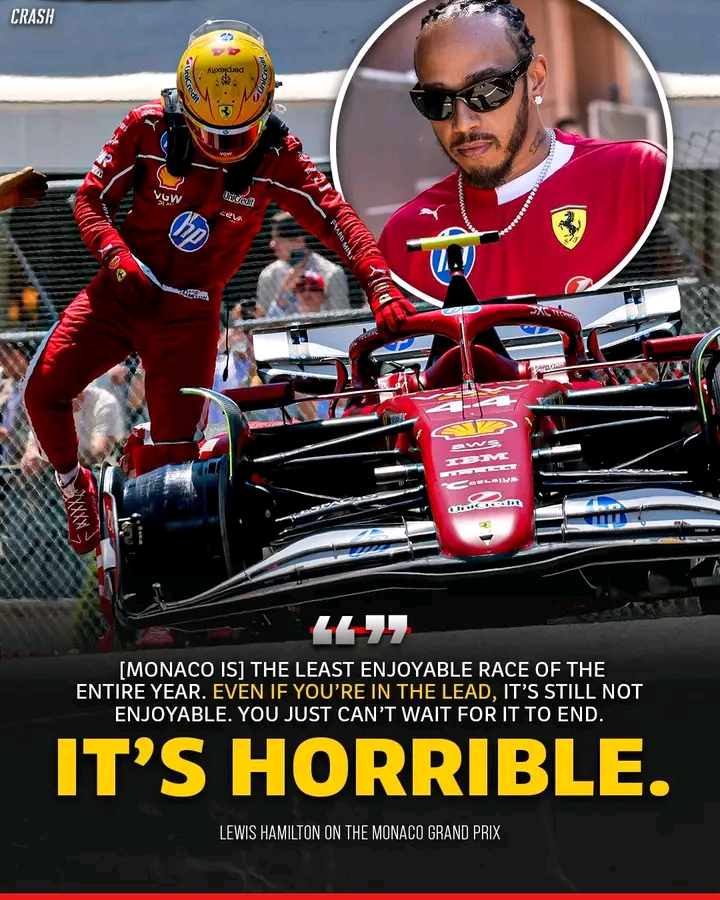Few circuits on the Formula 1 calendar evoke the same sense of mystique, glamour, and history as the streets of Monte Carlo. With its tight corners, unforgiving barriers, and a backdrop that looks like something straight out of a Bond film, the Monaco Grand Prix has long been considered the crown jewel of the F1 season. But in recent comments that have stirred both fans and paddock insiders, seven-time world champion Lewis Hamilton pulled no punches, labeling the race as “horrible” and the “least enjoyable” of the year.
A Harsh Critique from a Legend
Hamilton’s criticism comes from a place of experience. As one of the most successful drivers in the history of the sport, his opinion carries significant weight. In interviews following the 2025 Monaco Grand Prix, Hamilton voiced frustration at the lack of overtaking opportunities, the processional nature of the race, and how modern F1 cars have outgrown the narrow, winding streets of the principality.
“You’re just driving around, nowhere to go, can’t push,” he said. “It’s beautiful here, but as a race, it’s the least enjoyable. Honestly, it’s horrible.”
This isn’t the first time a driver has criticized the Monaco GP for its lack of actual racing, but coming from someone like Hamilton—who has both won at Monaco and battled through its challenges—his words ring louder than most.
A Race of Prestige, Not Performance
Monaco is, undeniably, more about status and spectacle than wheel-to-wheel action. For decades, fans and drivers alike have accepted the trade-off: a visually stunning event with minimal overtaking and a heavy emphasis on qualifying.
The circuit is only 3.337 km long and notoriously narrow, making it nearly impossible for cars to pass without risking catastrophe. In recent years, with the increasing size and complexity of modern F1 cars, that challenge has become even more pronounced. The result? Processional races where drivers largely maintain their grid positions unless strategy or chaos intervenes.
Hamilton’s critique highlights a broader issue: has Monaco become obsolete in the modern era of Formula 1?
Fans Divided: Tradition vs. Evolution
Reactions to Hamilton’s remarks have been mixed. Traditionalists argue that the Monaco GP is untouchable—a piece of living motorsport history that should never be altered or removed. For them, Monaco represents the soul of F1: the high stakes of threading a needle through tight barriers, the allure of the Riviera, the legacy of Ayrton Senna, Graham Hill, and other legends who mastered its challenges.
Others, however, side with Hamilton. They point to the lack of overtaking, the predictable outcomes, and how newer fans—accustomed to more dynamic races like those in Bahrain, Silverstone, or Austin—struggle to stay engaged during the 78 laps around Monte Carlo.
With Formula 1 pushing toward greater entertainment value and fan engagement through Sprint races, Drive to Survive, and format experimentation, Monaco increasingly feels like an outlier.
What Can Be Done?
The challenge with Monaco is that change is easier said than done. The city streets can’t simply be widened or reshaped without fundamentally altering the landscape. Proposals like shorter races, reverse grids, or mandatory pit stop changes have been floated, but each comes with controversy and logistical hurdles.
Alternatively, some suggest that Monaco should retain its place on the calendar but serve more as an exhibition or time-trial-based event rather than a standard race. This would preserve the tradition without compromising the sporting integrity of the championship.
Conclusion: Hamilton May Have a Point
Lewis Hamilton’s words may sound harsh, but they spark a necessary conversation. The Monaco Grand Prix is undeniably iconic, but in a sport that prides itself on innovation, it may be time to re-examine whether nostalgia should outweigh the need for compelling, competitive racing.
Hamilton’s frustration isn’t just the grumbling of a veteran; it’s the voice of a competitor who wants every race to matter, to challenge, and to excite. Whether or not fans agree with him, it’s clear that the future of Monaco in F1 is far from guaranteed—and it might just take more than charm and history to sec
ure its place in the seasons to come.
